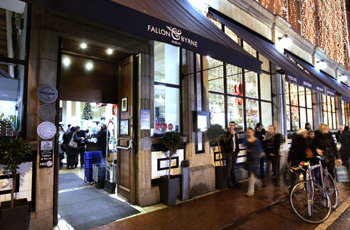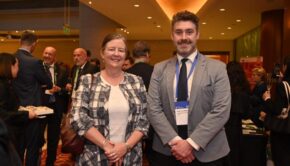Examiner appointed to Fallon & Byrne

Neil Hughes has been confirmed as the retailer's interim examiner and was granted up to 100 days to finalise a scheme of arrangement with the company’s creditors
16 January 2012
Award-winning food group Fallon and Byrne has told the High Court that the business is insolvent and unable to pay a €1.4 million tax bill.
Mr Justice George Birmingham granted the group protection of the court on 30 December by appointing chartered accountant Neil Hughes as interim examiner. Hughes’ appointment has since been confirmed. He now has up to 100 days to come up with a scheme of arrangement with the company’s creditors, which if approved by the High Court, will allow the firm to continue trading as a going concern.
Despite the recessionary climate, Fallon & Byrne still recorded an annual sales turnover of over €8 million at its restaurant and gourmet food hall in Dublin’s Exchequer Street.
However the court heard a family member who looked after the company accounts misappropriated company funds of more than €220,000 over several years.
The unnamed family member responsible had suffered a psychological breakdown and was no longer employed by the group, the court was told. She was unable to compensate the business.
Representing the company, barrister Gary McCarthy said the Revenue Commissioners had served a petition to wind up the company but the directors felt strongly that it could survive under examinership.
McCarthy said the group’s problems arose mainly from the directors Paul Byrne and Fiona McHugh’s decision to concentrate on front-of-house duties while leaving financial administration to an under-qualified bookkeeper member of Byrne’s family.
Unknown to the directors, substantial arrears of taxes in the region of €840,000 had been allowed to build up despite relevant returns having been made to the Revenue Commissioners.
McCarthy said the ability of the financial administrator to mask such a significant tax liability from the directors was a fundamental weakness in the systems the directors had established when the company began in 2006.
Fallon & Byrne had called in Delaney, Locke and Thorpe (DLT) accountants to represent it during an audit and discovered a number of inaccuracies and discrepancies in record keeping, McCarthy continued.
Yet he said DLT accountants believed that, given the protection of the court from its main and other creditors, the company could succeed again and was currently trading far above its breakeven turnover figure of €8 million, and already possessed a strong order book for 2012.



 Print
Print






Fans 0
Followers